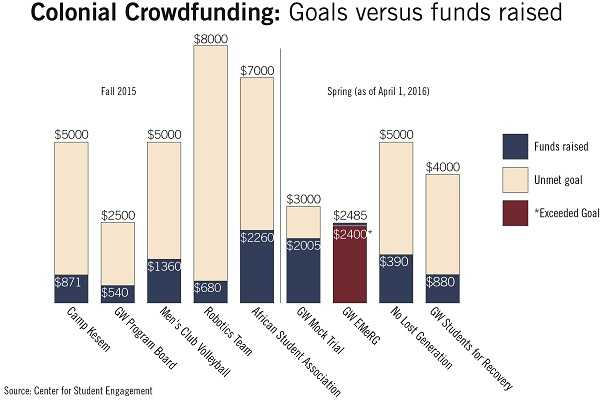Student leaders are hoping that the second time’s the charm for Colonial Crowdfunding projects.
The Center for Student Engagement first created the Colonial Crowdfunding program – which chooses student organizations to help crowdfund certain projects – last fall. A new set of projects were unveiled last month, though none of the five fall projects reached their fundraising goals.
Student organizations must submit an application to be selected for Colonial Crowdfunding, where they outline the details of their project and agree to use the funds raised responsibly and for the intended purpose. Officials said the University offers support to crowdfunding projects by publicizing them through social media channels and websites and guiding student leaders through the fundraising process.
University spokesman Kurtis Hiatt said that even with support from the University’s fundraising professionals, being selected for Colonial Crowdfunding does not guarantee success. Hiatt said that even on popular crowdfunding sites like Kickstarter and Indiegogo, projects only have a 36 percent success rate.
“Crowdfunding is popular, but that doesn’t make it easy,” Hiatt said.
Out of the nine total projects that have been picked for crowdfunding over the two semesters, only EMeRG has surpassed its goal – the group raised more than $2,400 to implement a mental health first aid certification course. The current groups can continue raising funds until April 18.
Timothy Rabolt, a graduate student involved in GW Students for Recovery, said there was an untapped base of donors who could fund the project. Students for Recovery hopes to raise $4,000 to refurbish and expand the Serenity Shack, an on-campus space for students in recovery from mental health conditions.
“We are fully confident we will meet and surpass our fundraising goal,” Rabolt said.
So far, Students for Recovery has raised $930 through Colonial Crowdfunding.
Matt Donovan, the co-executive director of No Lost Generation GW, a student group that spreads awareness about the Syrian refugee crisis, said the University has been helping them develop a fundraising plan.
“We’ve met with the development staff who are basically annual giving people so they know how to make an ask, they know how the whole system works,” Donovan said.
No Lost Generation has raised $395 of the $5,000 needed to host an April 29 conference that will bring together college students, government officials and experts to discuss ways to help refugees.

Although the groups from last semester did not meet their fundraising targets, they were able to raise funds through other means.
Abena Agyeman, the treasurer of the African Student Association, said the University could have done more to promote the crowdfunding page to the student body.
The ASA raised $2,260, less than a third of their goal, on the crowdfunding page, but Agyeman said they were able to raise the rest of their target $7,000 through restaurant fundraisers and direct donations.
“Our aim was to make it a bigger and better event than it has been in the past years,” said Agyeman. “We definitely could have promoted a lot more, and involved the whole GW community.
Experts said while crowdfunding pages are popular, they are no substitute for traditional fundraising efforts: hosting events and connecting with donors.
“People might think crowdfunding replaces traditional types of fundraising that is highly connective and highly personal, but people are still going to need to work and connect with people to be successful,” said Karin Cox, a senior executive vice president at the Kansas City-based fundraising firm Hartsook.







